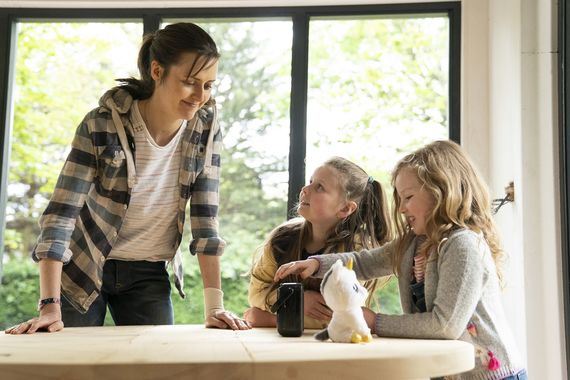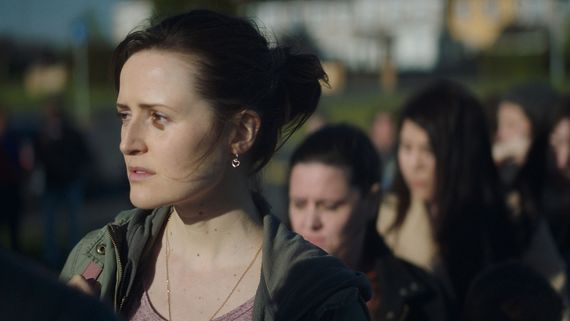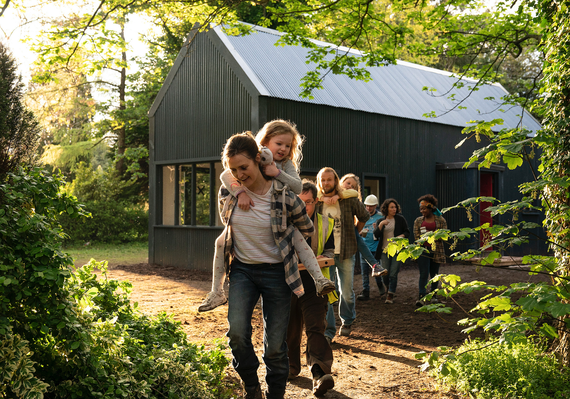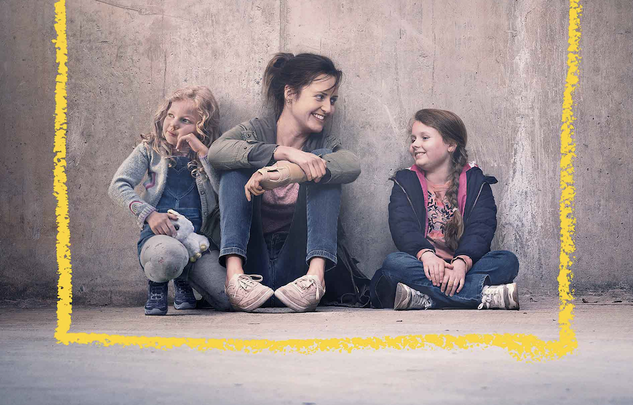In the new Irish film Herself actress Clare Dunne, 33, gives a breakout performance as a young Dublin mother trying to extricate herself from a violently abusive husband.
Playing a working-class woman named Sandra, Dunne's character works day shifts as a cleaner and nights staffing a bar to makes ends meet.
Given her punishing employment schedule and a full-time job as a mother, she obviously doesn't have a lot of personal time. Worse, when her abusive husband Gary (Ian Lloyd Anderson) discovers some of the cash she's saving to get away from him he breaks her hand.
Herself pulls no punches in the graphic depiction of marital abuse and trauma Sandra's facing and Dunne is so convincing in every scene that you'll be rooting for her to break away before you even know it.
Read more
The set up is one part Rocky and one part Roddy Doyle (Tina Kellegher, best known for The Snapper, even makes a pivotal appearance in the film as Gary's mother) but Herself swats away all the cliches on the strength of Dunne's performance, which is as convincing as can be.
Director Phyllida Lloyd (best known for Mama Mia and The Iron Lady) helms her most successful film to date with a slice of life realist approach that works from the first to last frame. The film's feminism isn't always exactly subtle but in these circumstances, it doesn't need to be.
Herself is about masculinity in crisis and society in crisis (they're usually linked) and the crisis they create for a hardworking woman who is working hard, doing her best, and deserves better from both. In the film when Sandra starts to look for her own place, she is seen lining up unsuccessfully with dozens of other would-be renters in suburban estates where cash and good connections are king.

Clare Dunne stars as an abused young Irish woman finding her way back to her life in Herself
Being shown one overpriced dump after another she finally snaps and wonders would it be better to find her own site and build her own place? Her smartphone comes to the rescue when after a few Google clicks she finds the webpage of an Irish builder who is proposing that exact solution to the hard-pressed Irish property seekers.
The problem is the builder is working overseas and won't be back for at least a year, which for Sandra in her current position might as well be a lifetime. Herself is particularly good about all of the hurdles that a woman in her position faces from social services, banks, the law, and good old-fashioned capitalism. Every road seems to end in a brick wall and no one seems to know how to help a woman in her position.

Clare Dunne stars as an abused young Irish woman finding her way back to her life in Herself
Recent films like Rosie, Adam & Paul, and Rialto have all shown us a gritty Dublin not seen in the tourist brochures, but Herself offers a potential solution to urban alienation from an ancient Irish tradition.
Meitheal is the name of an old Irish tradition that describes how neighbors would come together to assist in the saving of crops or other tasks. In helping others you help the life of your wider community, which the old Irish understood meant that you were also helping yourself.
That idea has gotten lost in the overheated Dublin property market but in Herself it inspires the band of volunteers that step up to help Sandra build her little house and save her life and family (consequently helping to save her community, because everything connects).
It's Dunne's indelible performance that carries the film. Gifted with the kind of acting chops that makes her look like we are watching a documentary rather than a film she's adept and pulling you in and making you understand how hard she has to work for the smallest reward.
Sandra isn't asking for handouts, she refuses to say die even when things get tough, and her deep courage in adversity impresses Peggy (Harriet Walter) the well to do doctor that she house cleans for, who asks if there is anything she can do to help?
That question turns out to be life-changing. Before long the two women make a pact and a village of volunteers is helping Sandra make her own house dream come true. But Herself isn't a Cinderella story. Her abusive husband wants sole custody of her kids and he has somehow found out that his wife is building a new home, which means she's also stepping out of his shadow. He takes her to court where, it soon becomes clear, the letter of law if not the spirit is very much on his side.
Herself shows us the post-traumatic stress Sandra experiences after near murderous beatings at the hands of a man who wants to take her kids as well as her life. It shows us how few options she has because she's so close to broke. It shows us how easily everything could slip away and it offers us a vision of cooperation.

Clare Dunne stars as an abused young Irish woman finding her way back to her life in Herself
It's Dunne's face that is the engine of this film, though. In it we see that she misses the man her husband used to be, she misses the life she might have had, she struggles and succeeds at being a standup mother and she keeps all of this in, without flinching. It's the kind of courage that you could easily miss, but Lloyd's up-close camera misses nothing, not a frown or a worry line. It's as naked a performance as you're likely to see.
Literally battered and bruised by hard experience, the joy of this film – and it is a real joy – comes from watching someone like Sandra find their way back to themselves and to life after a long exile in the hands and control of others.
Herself opened to a rare 100 percent rating on Rotten Tomatoes and made a big splash at Sundance in January, just before the start of the pandemic. You'll understand why it did within the first ten minutes.
It's so rare to see a story about an Irish woman, co-written by an Irish woman and directed by a woman make the big screen and make such a big slash. Herself is the reason that cinema exists, to tell the stories that don't get told, to shine a light into real life and how we survive it. Don't miss it.




Comments